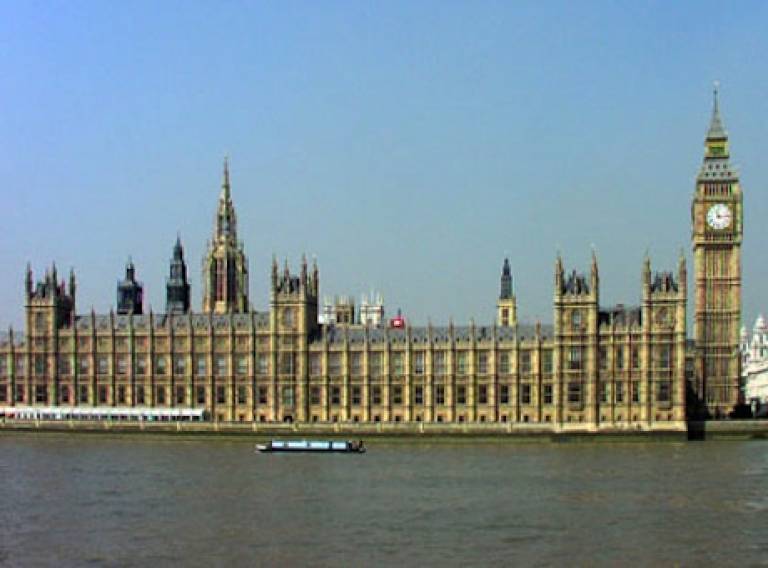Smart Meters – how can we ensure consumers win?
27 July 2012

Lisa Gobio-Thomas, a Doctoral Researcher at UCL Energy Institute attended the All Party Intelligent Energy Group (PRASEG) meeting on Smart Meters at the House of Commons on 3rd July 2012. The government has mandated energy suppliers to deliver smart meters to every home in the UK by the end of 2019. The aim is to help both households and energy suppliers to manage the use of energy more efficiently. The smart meter roll-out is expected to start in 2014 and be completed by 2019. This article provides a summary of the key issues expressed at the meeting about the government’s proposed smart metering programme.
The meeting comprised representatives from a wide range of stakeholders; consumer groups, energy suppliers, manufacturers of smart meters, members of parliament, researchers and OFGEM. I found it beneficial and informative to attend a meeting with viewpoints from a range of stakeholders about the smart meters programme.
Consumer acceptance of smart meters was a major concern expressed at the meeting. A study found that some householders did not want the smart meters installed in their homes even though the benefits had been explained to them. Consumers’ response is essential to the success of the smart meter roll-out. They will need to accept the installation of smart meters in their homes, respond to the information provided by the smart meters and adopt energy efficient behaviours if they are to reduce their energy use and bills. It is paramount that consumers are helped to understand and genuinely benefit from the smart meters programme. Understanding consumers’ interaction with smart meters was found to be very important. This includes understanding consumers’ experiences of using smart meters and how to make the experience better for them. Privacy and security issues were also raised as potential barriers to consumers’ acceptance of smart meters. To address this issue as well as provide effective consumer engagement on smart meters, the government has proposed to set up a Central Delivery Body (CDB) to manage centralised message and advertising about the smart meters programme. The CDB will also play an important role in promoting positive aspects of smart meters and rebutting negative claims.
Participants at the meeting felt that having a CDB was essential in providing an unbiased service and engagement with consumers about energy efficiency and the smart meters programme. It was strongly expressed that consumer engagement should not be left solely to the energy suppliers as it is not in their commercial interests to encourage consumers to reduce their energy use. Thus there was a risk that energy suppliers may neglect low income households and engage more with high income customers to sell them more products and services. The problem of accessibility was another concern expressed by consumer groups regarding consumers contacting the utility companies to discuss issues they may have with their smart meters. It was suggested that a free phone number should be available for customers to contact the utility companies about any problems experienced when using the smart meters.
It was suggested that a Code of Practice on the installation of smart meters in homes should be put in place between now and 2014. This will be very important in the provision of adequate consumer protection and guidelines to energy suppliers on smart meter installation in homes. Another area of concern expressed was whether consumers who already use prepayment meters will be able to have this option with smart meters. Customers who use prepayment meters tend to prefer them as they can manage their energy use and bills effectively. It was felt that having a prepayment option with smart meters will help to diversify ways in which householders can pay their energy bills.
A representative of the manufacturers of smart meters highlighted the importance of consumers understanding how to use smart meters and interact with the technology effectively in order to achieve energy savings. There was concern that disengaged consumers will not obtain any energy savings from their smart meters. Thus it was strongly expressed that the CDB, energy suppliers and third parties must effectively engage with consumers on how to use smart meters so that they are comfortable and confident in interacting with them. There was some concern as to whether the technical specification of smart meters aligned with the Smart Grid requirements. The importance of smart meters being as future proof as possible was expressed. Hence it was felt that obtaining the right technology and one that worked is absolutely crucial.
A key point raised was that the Smart Meters campaign must be linked to other energy related initiatives such as the Green Deal and the Smart Grid. It would be beneficial for the Green Deal and Smart Meter teams to work together to provide effective engagement with consumers on energy efficiency and information on the roll out of both programmes. In this way consumers will receive information about the smart meters and green deal programmes simultaneously in a co-ordinated manner giving consumers a wider knowledge of the energy programmes available. Consumers could also be given information on how they can benefit further from the installation of smart meters by participating in the Green Deal.
A number of key issues were raised that need careful consideration by the government, not least consumer engagement and acceptance of smart meters. There was also great concern about consumers not obtaining real energy savings from the installation of smart meters. In order for the programme to be successful and achieve energy savings, the government must continue its dialogue with a wide range of stakeholders to discuss and effectively address their concerns before commencing the smart meters roll-out.
 Close
Close

